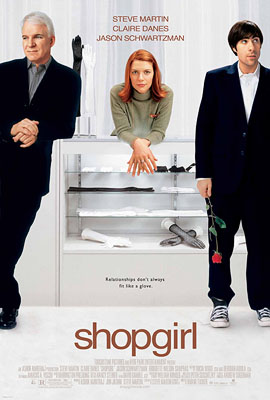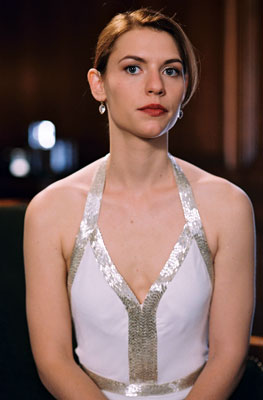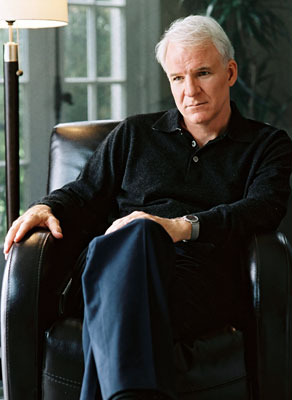|
Shopgirl
It will be difficult for many to ignore the obvious correlations between Shopgirl and Lost in Translation. Doing so does a disservice to both films, because although the each approach the subject of loneliness, they do so in their own individual ways.
Based on a novella by Steve Martin, Shopgirl tells the story of Mirabelle Buttersfield (Claire Danes), a Vermont transplant trying to make a life for herself in Los Angeles. The film tells its audience everything they need to know about Mirabelle in simplistic strokes. Take the opening of the film, consisting of a series of tracking shots inside Saks Fifth Avenue. Customers shop while salespeople help them sample everything from shoes to perfumes and makeup. The final tracking shot consists of a slow and unsteady push in on Mirabelle, with her dough eyes and cocked head vacantly staring off into space.
Time crawls for Mirabelle at work, and when she goes home she is greeted by her passions and a cat that refuses to socialize with her. Mirabelle's life is presented in solemn sweeping moments, her days repeat like cycles, and as they unfold we slowly learn more about her. We learn through vignettes that Mirabelle has some rather unique interests consisting of taking nude self-portraits on her bed with a Polaroid and charcoal sketches that are heavy on contrasting black and white. She takes pills, although we are not initially privy as to why.
In a visit to the student loan office, we learn that she is paying off her student loans, which total up to just over thirty-nine thousand dollars, at a mere fifty-four dollars a month. To use the word futile would be an understatement. One night she meets the aloof yet charming Jeremy (Jason Schwartzman) as she is doing her laundry in a local rundown laundromat. Jeremy's social graces are about as refined as his hygienic practices, which is to say that despite doing laundry, he rarely appears to change his clothes throughout the film.
Taking a chance, Jeremy asks Mirabelle for her phone number, and she obliges. Perhaps she sees something in his pathetic yet affable mannerisms and his ability to ignore the fact the he is blatantly broke and incapable of being considered a suitor in any sense of the word. Before she knows it, Mirabelle is on her first date with Jeremy, a sequence so humorous and downright embarrassing it should be packaged as the definitive guide to failed courting rituals.
Having brought nothing to the table other than providing Mirabelle with a ride to the Universal Citywalk, where she proceeds to pay for the two of them to catch a movie, Jeremy still somehow believes that he is entitled to a kiss at the end of the date, which she cleverly avoids before sending him packing. If Jeremy succeeds in anything at all, it is etching a memory of himself into Mirabelle's brain. His request to give her his phone number, based solely on the false assumption that she would actually desire to call him, is both cute and comical to say the least.
Naturally, his number finds its way to the bottom of the proverbial circular file, yet on the way home from work one day, a talk radio host's description of female desires during coitus causes Mirabelle to reconsider her decision, and leads to one of the most humorous "first times" ever put to film. The radio show host described the female desire for intimacy through being held, comforted, and being made to feel like the woman she is. Mirabelle obviously relates.
During the post-act after glow, there is no embrace or snuggling going on between Mirabelle and Jeremy. Perhaps sensing that his stock is rapidly declining, Jeremy rants about the trappings of amplifier designs, an industry he is closely involved in. Mirabelle suggests that he do something about his frustrations, and he takes to the task with steadfast dedication.
|
|
|
Not so wild, not
so crazy.
|
Viewers will see the writing on the wall for the odd couple when Mirabelle finds herself being courted by the much older and debonair Ray Porter (Steve Martin), a man who is all that Jeremy is not. Many will know this situation quite well, but they will not be prepared for the fashion in which the scenario unfolds. As young Jeremy seeks to make an upgrade in social status, Mirabelle finds embrace in the fingers of Roy, who on their second date manages to unfasten her watch and wrap his thumb and index finger gently around her wrist. "Now I'm your watch" he tells her, and this tiny little embrace is enough to have her all but swooning inside. We know, in an instant, that Roy is everything she desires, and in the same instant entirely wrong for her.
The outcome is inevitable, but it is not executed in any predictable fashion. What unfurls is refreshingly honest and genuine. That this sincere tale of love and dejection comes from the pen of such a sharp-witted satirist is not only surprising, but downright riveting. We know, all along, who is behind this story, and yet at every turn his regret and understanding seep through the cracks.
When Mirabelle finally finds what she has been searching for all along, it isn't wrapped up in a pretty bow that involves conflict resolution, a reveal of the love affair, and the all too typical race to right the wrongs of selfish actions. Instead there is only love, and the ability to make the right decision when presented with unfair and difficult situations.
Rating: 
|








